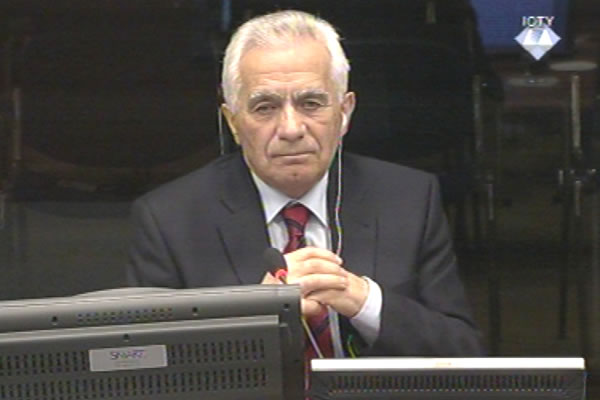Home
KRAJISNIK NOW DENIES RESPONSIBILITY HE HAD (PURPORTEDLY) ACCEPTED
In his application for early release, Momcilo Krajisnik managed to convince the Tribunal’s President that he ‘partially accepted responsibility for the crimes’ and wanted to work to achieve the ‘reconciliation of the three ethnic communities in BH’. In his testimony in Radovan Karadzic’s defense, Krajisnik tried to persuade the judges that the ‘other side’ bears the sole responsibly for the war. No one in the Serb leadership is responsible for the crimes, Krajisnik claimed
 Momcilo Krajisnik, witness at the Radovan Karadzic trial
Momcilo Krajisnik, witness at the Radovan Karadzic trial On the second day of his evidence in Radovan Karadzic’s defense, Momcilo Krajisnik, former Bosnian Serb Assembly speaker, claimed that the Serb political leadership was not at all to blame for the crimes against Muslims and Croats in BH. Karadzic is on trial for double genocide and four joint criminal enterprises. Krajisnik has recently been released after he served two thirds of his 20-year sentence for his part in the ethnic cleansing in several municipalities in BH.
President Meron granted Krajisnik early release: the explanation was that he ‘partially acknowledged the crimes’ and was prepared to help achieve ‘the reconciliation of the three ethnic communities’. Krajisnik’s evidence today showed that the two statements could not be more wrong.
Last week, Krajisnik shifted the blame for the war on the ‘other side’. Today, to emphasize the claim, Krajisnik said that Radovan Karadzic’s speech in the Assembly on 15 October 1991 wasn’t a threat but a warning to the Muslims. In the speech Karadzic said that choosing independence might take BH ‘into war, and the Muslim people maybe into extinction’.
Karadzic and Krajisnik argue that the Bosnian Muslim leadership chose war under the influence of ‘external factors’. Serbs wanted to avoid the war at any cost, Karadzic and Krajisnik claim. Karadzic played a speech by a Serb deputy, Miladin Nedic, who said ‘Muslims were foisted on us in order to make us their executioners’. Karadzic’s speech at the same session was played in court too: he claimed that the ‘conflict was fomented in order to eliminate the Serbs’. This, as Krajisnik explained, was ‘an expression of the views’ of the public and also a call for caution lest the Serb people should fall for this plan designed by the ‘external factors’.
Krajisnik said that The Bosnian Serb leadership didn’t plan the ethnic cleansing of parts of BH they claimed belonged to them, or any crimes against Croats and Muslims. Asked if he knew about a single municipality that was cleansed of non-Serbs during the war, Krajisnik replied: “Maybe there is one, but I can’t remember’. At the same time, Krajisnik remembered all to well that the ethnic structure hadn’t changed in some places inhabited by Muslims and Croats. In Krajisnik’s words, local authorities and mayors in Banja Luka, Srbac, Glamoc and elsewhere deserved credit for that. The SDS policy was always to protect non-Serb minorities, Krajisnik said, adding that Karadzic always told them they could live ‘comfortably, safely and without fear’.
The witness denied any responsibility of the Bosnian Serb army for the terror against Sarajevo civilians. On the contrary, the Serb side strove to spare the civilians, Krajisnik claimed. According to him, this is why the decision was made not to capture Sarajevo militarily. The Pale leadership wanted Sarajevo to be ‘transformed into two cities’: a Serb city and a Muslim city, with a Croat municipality. In Krajisnik’s view, Serbs were not responsible for the incidents that resulted in a number of casualties, such as the shelling of Dobrinja, Vase Miskina Street and the Markale market (on two occasions). Muslims attacked Serb positions from the city to provoke them into responding. Their intention was to paint the Muslims as victims and Serbs as aggressors, Krajisnik explained.
As far as Srebrenica was concerned, Krajisnik said that in July 1995 the Republika Srpska Presidency didn’t know anything about the crimes against Muslim prisoners. Krajisnik admitted that in those days he met regularly with Karadzic. However, not a word was said about the mass executions of Srebrenica men and boys at any of the meetings between 13 and 18 July 1995.
At the end of today’s testimony, Krajisnik revisited Karadzic’s allegation that his trial in The Hague was not legitimate because of a purported post-war promise made by US diplomat Richard Holbrooke. Karadzic invoked this promise on his arrival in The Hague, asking that the proceedings against him be suspended. The witness said that he attended a meeting in Belgrade when Holbrooke proposed a ‘gentlemen’s agreement’. If Karadzic agreed to step down from all his political functions, Holbrooke promised him that the Tribunal in The Hague would ‘become a thing of the past’. The undertaking to have the charges against Karadzic dropped was never put in writing, and we only have the word of the accused and his friend.
The examination-in-chief will be completed tomorrow. Karadzic has planned to call four more defense witnesses. Krajisnik will be cross-examined next week.
Linked Reports
- Case : Karadzic
- 2013-11-07 MOMCILO AND RADOVAN DRAW MAPS, YET AGAIN
- 2013-11-06 WAR CRIMINAL OR ‘INNOCENT OBSERVER’
- 2013-11-05 FOR TOHOLJ, SREBRENICA WAS A ‘VATICAN CONSPIRACY’
- 2013-11-13 KRAJISNIK’S DEMOCRATIC ASSEMBLY
- 2013-11-14 WHY DID KARADZIC TOLERATE BRDJANIN’S ‘IDIOTIC’ ACTIONS?
- 2013-11-15 WAS KARADZIC ‘AGGRESSIVE’ OR ‘VIOLENT’?
